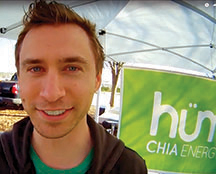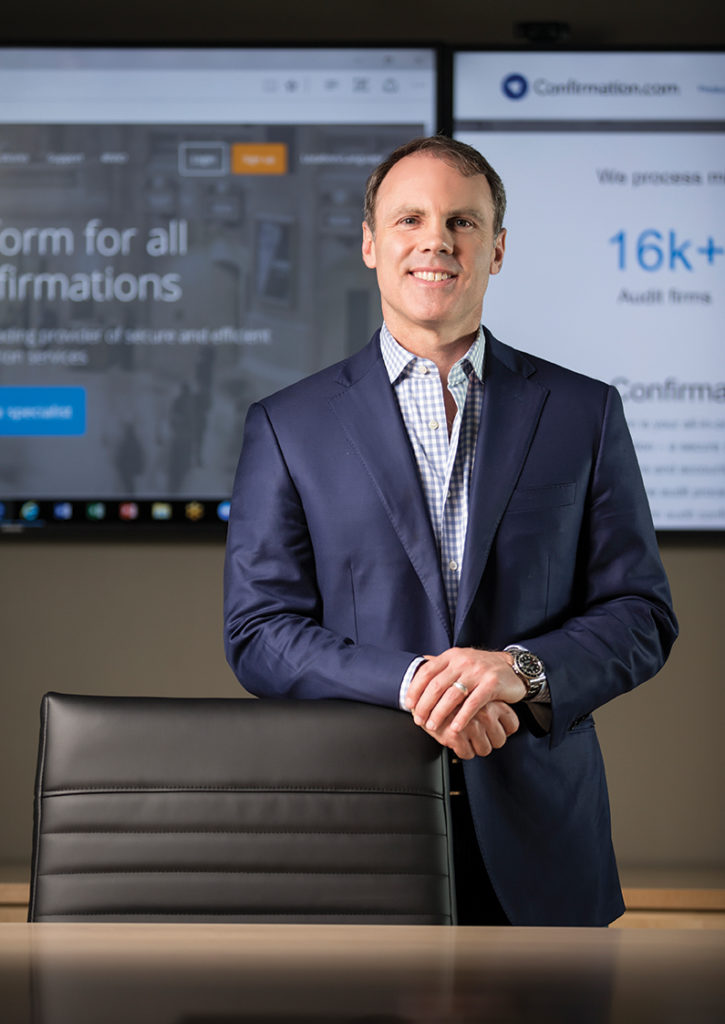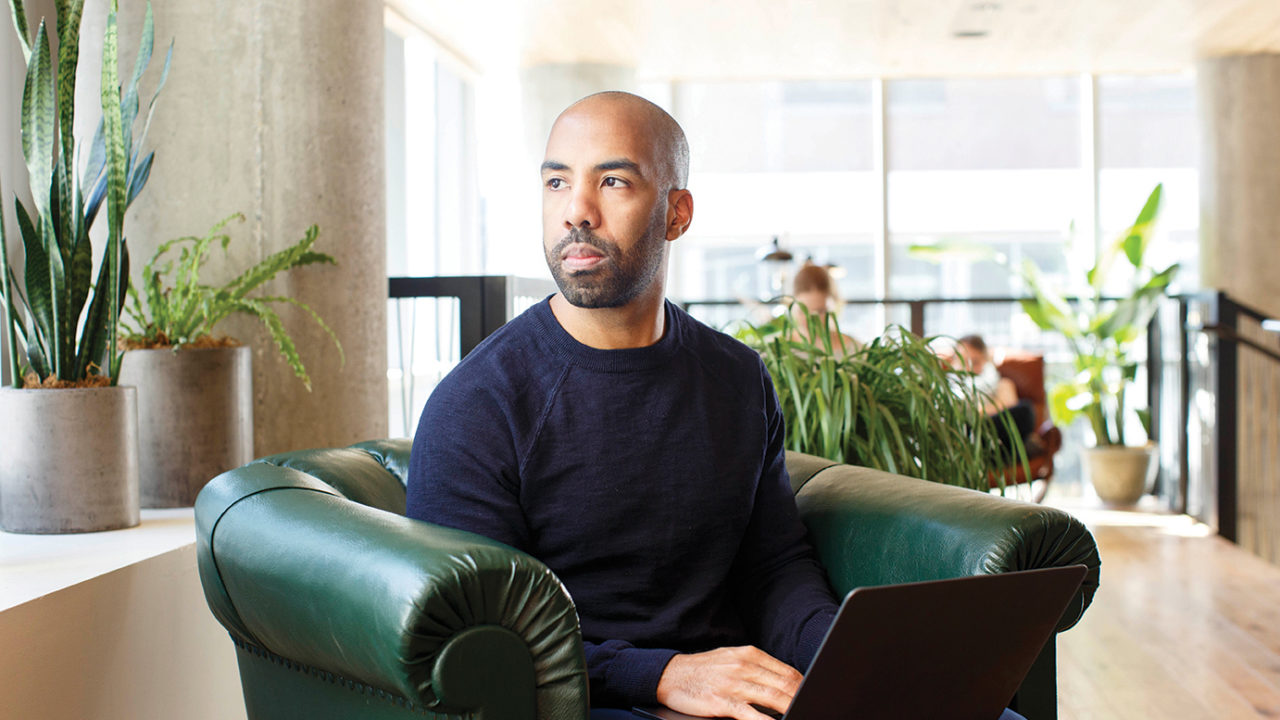By Nathaniel Luce
“I’m going to be honest—I’m stressed,” says James Murray. The co-founder and CEO of NewsCart is doing all of the things one would expect an entrepreneur to do, and maybe a few more. The 2017 MBA graduate travels the country pitching his product to potential clients and investors, but a major focus is navigating a feedback loop for his product: onboarding pilot customers, talking with them about the product, and working with his development team to incorporate changes and new features that meet customer demands.
“We have biweekly calls with customers just to talk about the product and what went right and wrong,” he says. “We then sit down and triage their inputs and decide what features we’re going to incorporate. I function as a project manager and make sure it gets done.”
The challenges? “Too many,” he says with a chuckle. “Building technology is hard, especially enterprise-level technology. Things are going to be buggy, things are going to crash. Which is a good thing, because it means people are using your technology.”
That relentless optimism, the ability to find the success in the setback, is a necessary feature of the entrepreneur, and Murray has it in abundance. The weight of a dozen or more responsibilities shows on his face, even when he is fully focused, but he maintains an earnest, upbeat and engaged countenance, operating both fully within himself and out.
“This is one of the most stressful things I’ve ever done,” he continues, “but I’m learning, I’m growing, and I’ll be better because of that. I have no regrets. I wouldn’t be doing anything else.”
While entrepreneurial stories are compelling, the entrepreneurs themselves are the heart of the attraction. They have a captivating ability to juggle multiple jobs, overcome incredible challenges and battle self-doubt. Their belief in the venture guides them to greater heights personally and ultimately financially.
Here are three Owen entrepreneurs, each running ventures at different stages in the life cycle, with stories and lessons that could apply to anyone in the business world, whether they operate out of a garage or an office tower.
NewsCart: A simple way to discover and share news with your employees
NewsCart offers a software-as-a-service solution for collecting and sharing news, leveraging machine learning to help communications professionals find and disseminate content through a single platform. Multiple companies from the profit and nonprofit world are piloting the service, a would-be customer base that Murray believes will result in business down the road, which in turn helps drive investor interest.
A few incumbents have operated in this space for over a decade, so every account helps NewsCart build credibility in the market. NewsCart’s strategy to onboard customers through pilots may be a heavy lift, but it’s already paying off. Murray and his team recently earned their first paying, enterprise level customer, a major New York-based publisher. “It’s great, because enterprise sales cycles last forever,” he says.
The 2017 graduate developed the news aggregator concept at Owen, initially in Michael Burcham’s Launching the Venture class. “That class changed my life,” he says. “It provided me the framework to build a viable business.”
NewsCart earned accolades and grants in Murray’s second year, most notably a $25,000 Sohr Grant and a first-place finish at the 2017 SXSW PitchTexas competition. By graduation, Murray had a CTO and team of developers in place, and significant momentum in the marketplace.
Murray has set his sights on venture capital in 2018 as he continues to scale the business. “We’re not quite ready to raise an institutional round yet, but we will be soon,” he says. “I’m spending a lot of time warming up relationships, so when we’re ready to pull the trigger, we’ll have some options and people we can reach out to.”
Murray cites Germain Böer, professor of accounting, emeritus, as a constant source of support, both before and after graduation. “That’s a really special thing about Owen,” Murray says. “Once you graduate, it’s not over. I can call Germain, walk into his office, talk about problems, and it’s just like I’m a student.” He’s also worked with the Wond’ry, Vanderbilt’s epicenter for innovation and entrepreneurship, which has provided NewsCart with a microgrant and promotion. Owen’s Alumni Relations department has also been a rich resource, providing connections to entrepreneurs and venture capitalists.
“For me, building momentum while I was in school and being able to take off immediately coming out of Owen was the best thing I could’ve done,” he says.
Húma Gel: Long-lasting, all-natural chia energy
“I read a book called Born to Run in 2009 while I was in Iraq, and I thought it was the greatest thing ever,” says Ian McCollum, MBA’12, when asked about the inspiration for his company. The ethnography, written by Christopher McDougall, chronicles the Tarahumara, a native Mexican tribe whose members frequently indulge in runs of 100 miles or more.

Ian McCollum
McCollum, a former Division I cross country runner, was intrigued by the tribe’s use of chia seeds to provide energy during their supremely long runs. As an Army captain, he was constantly on the lookout for an energy supply that would provide the necessary fuel to fulfill his duty without stomach irritation.
“I wasn’t going on 100-mile runs, but I was going on 12-hour foot patrols in the desert,” he explains. He began mixing chia seeds with lemon and occasionally sugar packets in his canteen. “It kept me going better than Gatorade or any of the other stuff did,” he says.
Flash forward two years, and McCollum arrives at Vanderbilt on the Lanier Foundation Scholarship. “With student loans, I would have felt compelled to focus on what I had to do,” he says. “But with the scholarship I had the opportunity to explore what I wanted to do. It was a huge blessing.”
As he started looking for opportunities, the concept of a chia-based energy gel for endurance athletes emerged as his most viable idea, and one that he could launch immediately. The energy gel business was relatively new, as was the convenient packaging that appeals to endurance athletes. McCollum saw a chance to bring an all-natural product to market that tasted great.
He pitched “Húma Gel” for a summer stipend in the fall of his first year, but it fell flat. “I had a terrible presentation, and I kind of winged it, so I got hammered for it,” he recalls. “But pitching allowed me to really refine the idea.” After putting serious work into his business plan, he applied for the Sohr Grant in the spring and won.
“I came to Owen not knowing anything about business, so I came to school to get that stamp of approval so I could operate in the business world,” McCollum says. “Going through the Sohr process and having business people say ‘You might have a viable plan’ was a huge relief for me. And I got $25,000 from it.”
Working with Kevin Sherbourne, MBA’10, a friend of 20-plus years who was the first who encouraged him to attend Vanderbilt, McCollum developed the formula in his kitchen. “We build it entirely off the shelves of Whole Foods,” he says, “with a mixing bowl, tossing in different ingredients. If you’re going for an all-natural product, there’s only a few things you need to know.”
He worked with the Cornell Food Venture Center to ensure that his product was shelf-stable, following its guidelines and sending a sample for testing. Once the gel fit the criteria, he worked with a contract manufacturer to produce the final product, which was delivered to his door in November 2012, just in time for a Nashville marathon.
“We presented at the expo and set up a booth,” he recalls. “I remember the first customer walking up, and I gave her my sales speech. She could tell I was nervous, but she tried it and said it was good and bought some. That calmed things down a lot.”
Húma Gel made money on the event, and from there McCollum started to identify sales channels. After creating a target list of 200 retail locations, he canvassed the Southeast, dropping off samples at accounts from Kentucky to Florida. “We had a yellow Chevy Aveo (a subcompact). I pulled out the back seat, and if I angled myself just right, I could sleep in it without bending over,” he says. “For four months, I slept in the back of Walmart parking lots, surrounded by product.”
The grind paid off. Húma Gel picked up 75 accounts over those four months, which attracted sales representatives. The company’s base expanded. “That snowballed into what we have now,” he explains. Five years later, Húma Gel can be found in nearly all 50 states and a dozen countries.
So has McCollum “made it” as an entrepreneur? “Any entrepreneur will give you a different answer, because it depends on goals,” he says. “Goals can shift, as you get more successful or have more perceived success. I thought, ‘If I can make $40,000 a year working a minimal amount of time, then I can reassess my life.’ We hit that in three months, so I had to ask, ‘What’s going to keep me going?’”
For now, McCollum looks to create enough different product lines so that “if one of them explodes, it doesn’t entirely ruin my standard of living.’” The company is in the process of rolling out new products, once again developed in the kitchen. After achieving that diversity, McCollum is still searching for a “high enough standard of living where I can be comfortable.”
His goals may change, but McCollum has reached one goal that sticks with him. “When I hit $40,000 a year, I stopped feeling like the adults were going to walk in and say ‘play time’s over,’” he says. “When that feeling subsided and I realized I was in charge, that was a big milestone.”
McCollum’s advice for would-be entrepreneurs? “It doesn’t have to be a venture-backed company,” he says without hesitation. “Lifestyle companies are entirely viable, and there are more opportunities to start one now than in the history of the world. With technology, it’s easier than ever.”
Confirmation.com: The world’s leading provider of secure, efficient confirmation services
Despite being jet-lagged, Brian Fox, MBA’01, is willing to chat at 4:30 a.m. local time. After all, his company just posted its first $10 million month. “We’re in Japan right now to celebrate a huge milestone,” he explains. “We’re going to all of our offices to celebrate. It’s been a lot of fun.”

Brian Fox, MBA’01, is founder of Nashville-based Confirmation.com, the world’s leading provider of secure and efficient confirmation of corporate data, with offices in 25 countries.
With offices in 25 countries, the president and founder of Confirmation.com (and one of Accounting Today’s 100 Most Influential People in Accounting in 2017) stands to earn a few (thousand) frequent flier miles on the celebration tour.
The distance between where Fox’s company started and where it is now might be best measured in light-years. The world’s leading provider of secure and efficient confirmation services has processed over a trillion dollars of confirmation data and detected billions of dollars in fraud. Its 200 employees service 16,000 accounting firms and 6,000 banks in 180 countries. After hitting No. 96 on the Inc. 500 in 2010, Confirmation.com has remained on the Inc. 5000 for the last 8 years.
Fox, a former associate at Ernst & Young and PwC, started the company in the summer of 2001 in lieu of an internship. He funded the venture with life insurance proceeds after his father passed away during his second semester.
The class president divided his weeks between class and business, scheduling classes two days a week to maximize the time he could dedicate to Confirmation.com. The internet bubble had burst, but Fox’s vision—using the internet to turn a paper-based process into an electronic one—had generated enough interest to spur him on. “I showed the business plan around, and it was like Field of Dreams: If you build it, they will come,” he says.
The insurance proceeds were dwindling in fall 2001, and Fox and his team were hopeful that an early September pitch would keep the company afloat. He remembers the timeline vividly. “We made the pitch on September 8,” Fox says. “They called the next day to say an HR issue had delayed their decision, and they needed to decide next week.” When 9/11 occurred a couple of days later, that potential funding disappeared immediately.
So Fox and his team moved into his grandmother’s garage at the intersection of Route 70 and Highway 100 on the west side of Nashville. To stay afloat, Fox paid everyone in stock, delayed payments on his student debt, and ran up the credit cards. He also looked for investors. “I would take investments of $500 or $1,000 from whoever was willing,” he says. “My capitalization table was my Thanksgiving table: friends, family, anyone who felt sorry for me. We did that for two years.”
His in-laws would provide cash to support Fox’s family, which included two young children and an adopted 14-year-old son. “If it had been my own money, it would’ve been easy to pack it up, but I knew I had to pay back family and friends,” he says. “I couldn’t walk away when it got difficult.”
Confirmation.com continued to show positive signs, and after two lean years of microloans and hustling, Fox was able to raise $750,000. “That was the first funding that allowed us to think past 30 days,” he recalls. The company hit cash flow positive in 2009, and through subsequent rounds of funding raised roughly $10 million.
The tipping point toward success came in 2008, but the origins came a few years earlier. It was in the wake of the collapse of Parmalat, a multinational Italian dairy and food corporation whose CEO was charged with financial fraud and money laundering. Confirmation.com earned press from the fallout because its services could have detected the fraud.
Bank of America, caught up in the scandal but cleared of any wrongdoing, took a closer look at Confirmation.com’s services and quickly realized the potential value. BofA mandated that anyone confirming information from the bank would have to use Confirmation. com.
“We went from 200 accounting firms to 5,000 accounting firms,” Fox recalls. “And after that, other banks started mandating our services as well.”
Last October, Confirmation.com raised a $60 million round, allowing Fox and his team to provide shareholders a significant return. More than 20 people pocketed $1 million or more. “That was really cool. We gave 5.5 times to 19 times returns on initial investments. I was able to pay family back,” Fox says.
The company was also able to channel funds into international expansion. With continued expansion into South America and the Middle East, as well as new product offerings on the horizon, the company still has plenty of room to grow.
Even with garage days long behind him, Fox still feels that self-imposed pressure he felt in leaner years, but now it’s different. “We need to grow at scale while maintaining our culture,” he says. “For us, that’s putting the client first, keeping that entrepreneurial spirit and empowering the team to creatively solve problems. Every time we enter a new market or roll out a new service, that’s an entrepreneurial adventure, and it’s a lot of fun for us.”
Fox’s passion for entrepreneurship has extended to other ventures as well. He has invested with the Nashville Capital Network— Sid Chambless, MBA’03, and Chase Perry, MBA’08, are the managing partners—and other Nashville-based businesses. He offers several words of wisdom for new and aspiring entrepreneurs.
